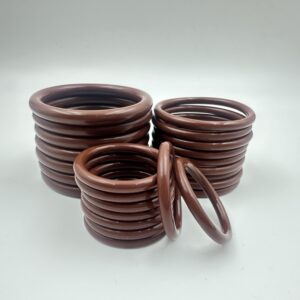Table of Contents
ToggleWhat is a FKM O-Ring?
A FKM O-ring is a high-performance sealing component crafted from Fluorocarbon Rubber (FKM), a class of fluoroelastomers renowned for their exceptional resistance to extreme temperatures, aggressive chemicals, oils, and fuels. Widely used in industries demanding reliability under harsh conditions, FKM O-rings balance durability with versatility. Below is a comprehensive overview of their composition, properties, applications, and standards.


1. Material Composition
FKM (designated as FPM under ISO standards) is a synthetic elastomer characterized by fluorine atoms bonded to its polymer backbone. The primary monomer, vinylidene fluoride, is combined with co-monomers to tailor performance for specific environments. Key distinctions in nomenclature include:
- FKM: ASTM D1418 designation (U.S. standard).
- FPM: Equivalent ISO 1629 classification.
- Viton®: A proprietary FKM formulation trademarked by Chemours (formerly DuPont), often used generically in industry literature.
FKM compounds comply with standards such as ASTM D1418 and ISO 1629, ensuring consistency in material quality and performance.
2. Key Properties
Temperature Resistance
FKM O-rings operate effectively in temperatures ranging from –20°C to +260°C (–4°F to +500°F). Specialized grades extend this range to –40°C or +300°C, making them suitable for extreme thermal environments.
Chemical Resistance
- Resistant to: Oils, fuels, hydraulic fluids, acids, aromatics, hydrocarbons, and most organic solvents.
- Not Recommended for: Ketones, esters, amines, hot alkalis, and certain polar solvents.
Mechanical Performance
- Compression Set Resistance: Maintains seal integrity under prolonged compression and thermal cycling.
- Aging & Ozone Resistance: Exceptional durability against UV exposure, oxidation, and ozone degradation.
- Flexibility Trade-offs: Higher fluorine content enhances chemical resistance but reduces low-temperature flexibility in standard grades.
3. Applications
FKM O-rings are indispensable in industries requiring reliability under stress:
- Automotive:
- Engine seals, fuel injectors, turbocharger systems.
- Resists degradation from automotive fluids and high under-the-hood temperatures.
- Aerospace:
- Hydraulic systems, jet engine components.
- Ensures leak-proof performance in extreme pressure and temperature fluctuations.
- Chemical Processing:
- Valves, pumps, and pipelines handling acids, solvents, or high-temperature fluids.
- Industrial Machinery:
- High-vacuum seals, compressors, reactors.
- Compliant with FDA/USP standards for pharmaceutical equipment.
4. Grades & Variants
To address diverse operational needs, FKM is available in specialized formulations:
- Standard FKM: Balanced chemical and thermal resistance for general-purpose use.
- Low-Temperature FKM: Enhanced flexibility at sub-zero temperatures.
- High-Fluorine FKM (e.g., FFKM): Maximized chemical resistance for extreme environments, such as semiconductor manufacturing.
5. Advantages Over Other Elastomers
- Superior Heat Resistance: Outperforms NBR, EPDM, and silicone in high-temperature applications.
- Long Service Life: Retains sealing properties in chemically aggressive or thermally cyclic conditions.
- Broad Compatibility: Effective with oils, fuels, and many industrial chemicals.
6. Limitations
- Cost: Higher material cost compared to standard elastomers like NBR.
- Low-Temperature Limitations: Standard grades may stiffen below –20°C.
- Chemical Incompatibility: Unsuitable for polar solvents or specific alkaline environments.
7. Standards & Quality Assurance
FKM O-rings adhere to stringent industry specifications:
- ASTM D2000 and SAE J200: Define material performance metrics.
- ISO 3601: Specifies dimensional and tolerance standards for O-rings.
- Genuine Viton® Certification: Indicates compliance with Chemours’ quality guidelines for 100% virgin FKM material.
Conclusion
A FKM O-ring is a critical sealing solution engineered for demanding environments where heat, chemicals, or mechanical stress compromise conventional elastomers. While its higher cost and specific compatibility limitations require careful consideration, FKM’s unmatched durability and resistance make it indispensable in automotive, aerospace, chemical, and industrial applications. By selecting the appropriate grade and adhering to industry standards, engineers ensure reliable performance in even the harshest conditions.



Leave A Comment